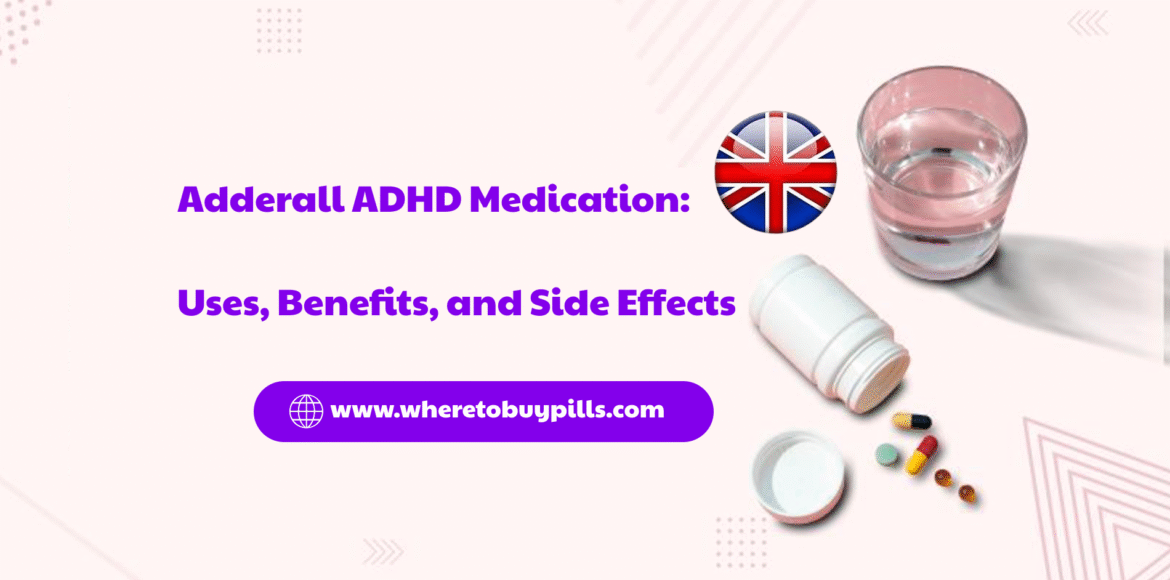Adderall ADHD Medication: Uses, Benefits, and Side Effects Buy Adderall Online
Adderall is one of the most widely prescribed ADHD medications in the world. It has helped millions of people — both children and adults — gain better control of attention, focus, and impulsivity.
But what exactly is Adderall, how does it work, and what are the potential side effects or risks? In this article, we’ll break down everything you need to know about Adderall as an ADHD treatment, including benefits, dosage guidance, and safe usage tips. Adderall ADHD medication.
What Is Adderall?
Adderall is a prescription medication that contains two active ingredients:
-
Amphetamine
-
Dextroamphetamine
These compounds are central nervous system stimulants that affect the brain’s levels of dopamine and norepinephrine — neurotransmitters responsible for focus, motivation, and alertness.
Adderall is classified as a Schedule II controlled substance in the United States, meaning it has legitimate medical uses but also a high potential for misuse or dependence if not taken as prescribed. Adderall ADHD medication.
How Adderall Works for ADHD
People with ADHD often have lower levels of dopamine and norepinephrine in areas of the brain that control attention and behavior.
Adderall helps by:
-
Increasing dopamine availability
-
Enhancing signal transmission between neurons
-
Improving executive function and focus
-
Reducing impulsivity and hyperactivity
The result is improved mental clarity, task management, and concentration, which can help both students and professionals perform better in daily activities. Adderall ADHD medication.
Types of Adderall
Adderall comes in two main forms:
1. Adderall Immediate Release (IR)
-
Starts working within 30–60 minutes
-
Lasts 4–6 hours
-
May require multiple doses per day
2. Adderall Extended Release (XR)
-
Designed to release medication gradually over 10–12 hours
-
Taken once daily, typically in the morning
-
Helps maintain focus throughout school or work hours
Your doctor will determine which version best fits your needs based on your symptoms, schedule, and how your body metabolizes the drug. Adderall ADHD medication.
Adderall Dosage Guidelines
Dosage varies depending on age, body weight, and medical history.
Typical starting doses include:
-
Children (6–12 years): 5 mg once or twice daily
-
Adolescents and adults: 10–20 mg daily, titrated up as needed
Your healthcare provider may adjust your dose over time to achieve the desired balance between effectiveness and side effects.
⚠️ Important: Never adjust your dose or stop taking Adderall suddenly without consulting your doctor — doing so can cause withdrawal symptoms like fatigue, depression, or irritability. Adderall ADHD medication.
Benefits of Adderall for ADHD
When used correctly, Adderall can deliver significant improvements in attention and functioning.
Key benefits include:
-
Enhanced focus and concentration
-
Better impulse control
-
Increased motivation and productivity
-
Improved academic or work performance
-
Reduced restlessness and distractibility
Many users report feeling calmer and more capable of organizing tasks and managing time effectively. Adderall ADHD medication.
Potential Side Effects of Adderall
Like all stimulant medications, Adderall can cause side effects, especially when dosage isn’t optimized.
Common side effects include:
-
Dry mouth
-
Loss of appetite
-
Difficulty sleeping (insomnia)
-
Headache
-
Nervousness or irritability
-
Increased heart rate
Serious side effects (rare):
-
Chest pain or irregular heartbeat
-
Shortness of breath
-
Mood swings or aggression
-
Hallucinations
-
Dependence or withdrawal
If any severe side effects occur, contact a doctor immediately.
Who Should Not Take Adderall
Adderall is not suitable for everyone. You should avoid or use caution if you have:
-
Heart disease or high blood pressure
-
Glaucoma
-
Severe anxiety disorders
-
History of substance misuse
-
Hyperthyroidism
Always disclose your full medical history before starting stimulant treatment. Adderall ADHD medication.
Adderall and Misuse Concerns
Because Adderall boosts dopamine, some people misuse it for energy or studying. However, taking it without a prescription is illegal and dangerous.
Misuse can lead to:
-
Addiction
-
Heart complications
-
Anxiety or psychosis
-
Sleep problems
Adderall should only be taken under medical supervision and as part of a structured ADHD treatment plan.
Natural Alternatives to Adderall
For those unable or unwilling to use stimulants, several natural or non-stimulant options may help manage ADHD symptoms.
-
Behavioral therapy
-
Mindfulness and meditation
-
Regular exercise
-
Caffeine with L-Theanine
-
Omega-3 supplements
-
Non-stimulant medications (e.g., Strattera, Guanfacine)
These alternatives can provide mild to moderate improvements in focus and mood without the risks associated with amphetamines.
Managing Adderall Safely
To get the best results from your Adderall prescription:
✅ Take it exactly as prescribed.
✅ Avoid caffeine and alcohol while on the medication.
✅ Eat balanced meals to counter appetite loss.
✅ Take your last dose early in the day to prevent insomnia.
✅ Have regular medical checkups to monitor blood pressure and side effects.
FAQ: Adderall ADHD Medication
1. What does Adderall do for ADHD?
It boosts dopamine and norepinephrine levels, improving focus, attention, and impulse control.
2. Is Adderall safe for long-term use?
When monitored by a doctor, yes. Regular checkups help ensure safe, effective long-term treatment.
3. How long does Adderall last?
Adderall IR lasts around 4–6 hours, while Adderall XR can last 10–12 hours.
4. Can you get addicted to Adderall?
Yes. Adderall has a potential for dependence, especially if misused or taken without a prescription.
5. What are natural alternatives to Adderall?
Options include Omega-3s, Rhodiola Rosea, caffeine + L-Theanine, and mindfulness-based therapies.
Final Thoughts
Adderall ADHD medication can be life-changing for individuals struggling with attention, organization, or hyperactivity.
When prescribed responsibly and monitored by a healthcare provider, it helps restore focus and balance in daily life.
However, because Adderall is a powerful stimulant, it’s crucial to follow medical advice carefully and avoid self-medication.
With proper guidance, Adderall remains one of the most effective tools in modern ADHD management.


